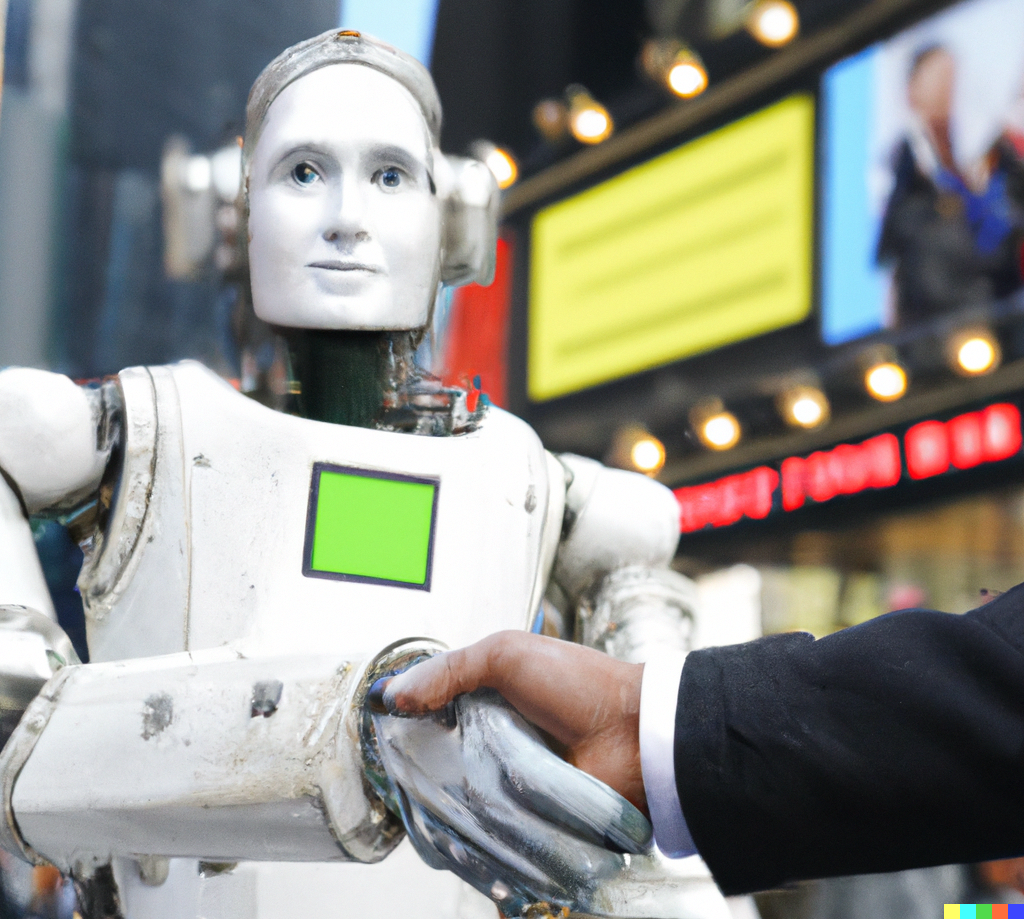

AI and Automation in Marketing and their Impact on Marketers
Artificial intelligence (AI) and automation in marketing is becoming increasingly prevalent and is transforming how businesses approach and interact with their customers. AI has the potential to revolutionize marketing by automating routine tasks, providing personalized experiences, and delivering valuable insights that can inform better decision-making.
With the rise of AI, marketing professionals are faced with a new set of challenges and opportunities. On the one hand, AI has the power to create more efficient and effective marketing strategies. Still, on the other hand, it raises concerns about job losses and over-dependence on technology. The impact of AI in marketing is a highly polarizing topic, and it is crucial to understand its potential benefits and drawbacks to stay ahead in a rapidly changing industry.
As AI becomes more advanced, businesses and individuals need to understand its impact on the industry and the job market. A deep understanding of AI in marketing can help businesses leverage its benefits to increase efficiency, productivity, and profits while reducing costs and improving customer experiences. On the other hand, it is equally important for individuals – marketers, to understand the implications of AI on their careers, as it may lead to job losses or the need for re-skilling and up-skilling. By staying informed about the impact of AI and automation on marketing and jobs, businesses and individuals can be better prepared for the future and ensure success in a rapidly evolving landscape.
The Rise of AI and Automation in Marketing
Artificial intelligence (AI) is the simulation of human intelligence in machines designed to think and act like humans. In marketing, AI uses algorithms, machine learning, natural language processing, and other advanced technologies to automate and optimize various marketing tasks. AI in marketing is used to personalize advertising, automate customer service, and provide valuable insights that inform better decision-making. Automation in marketing refers to the use of technology to automate repetitive or time-consuming tasks, freeing up time for more strategic and creative work. It can include email marketing, social media management, and data analysis. AI and automation in marketing work together to provide more efficient and effective marketing strategies and deliver better customer experiences.
Advancements in AI and Automation in Marketing
The advancements in AI and automation in recent years have significantly transformed the marketing industry. With the increasing availability of data and computing power, AI has become more advanced and accessible to businesses of all sizes. Machine learning algorithms have become more sophisticated, allowing AI systems to make more accurate predictions and recommendations. Natural language processing has improved, enabling AI systems to understand better and respond to customer inquiries.
Automation has also become more advanced, with the development of marketing automation platforms that can automate complex tasks and provide valuable insights in real time.
These advancements in AI and automation have paved the way for more efficient and effective marketing strategies and improved customer experiences. As AI and automation evolve, they can further transform the marketing industry and how businesses approach their customers.
Let’s look at a few examples of how organizations have used AI to improve their marketing.
Personalized Advertising
Amazon’s AI algorithms analyze customer data to provide personalized product recommendations based on their browsing and purchase history.
Similarly, Netflix uses AI algorithms to provide personalized movie recommendations based on a customer’s viewing history and ratings.
Chatbots
H&M has implemented a chatbot that uses natural language processing to provide customers with quick and efficient customer service. The chatbot can answer frequently asked questions, provide product information, and process orders.
Bank of America has implemented a chatbot that allows customers to manage their accounts through messaging. The chatbot can answer account-related questions, provide account balances and transaction history, and even allow customers to transfer money.
Predictive Analytics
Walmart uses predictive analytics to analyze customer data and predict product demand. This allows the retailer to optimize inventory management and reduce waste.
Coca-Cola uses predictive analytics to analyze sales data and make more accurate sales forecasts. This helps the company optimize production and distribution.
Customer Segmentation
Starbucks uses customer segmentation to personalize its loyalty program and provide targeted customer promotions. The company uses data on customer behavior, such as purchase history and frequency of visits, to segment its customer base and deliver personalized experiences.
Nike uses customer segmentation to personalize its marketing campaigns. The company uses data on customer behavior, such as preferred products and past purchases, to create targeted campaigns for each customer segment.
Benefits of AI and Automation in Marketing
While this list can be long, one can classify the benefits of AI and automation into four broad buckets.
Increased Efficiency and Productivity
AI and automation in marketing can increase efficiency and productivity by automating repetitive and time-consuming tasks, freeing time for more strategic and creative work.
For example, chatbots can handle customer inquiries and automate customer service, allowing marketing teams to focus on more complex tasks. Automated email marketing can also save time and effort by automating the sending of emails, freeing up time for other tasks. Additionally, AI algorithms can process large amounts of data faster and more accurately than humans, allowing marketing teams to make better decisions more quickly.
Improved Customer Experience:
AI and automation in marketing can improve the customer experience by providing more personalized and relevant interactions.
For example, personalized advertising can provide customers with recommendations for products more relevant to their interests, leading to a better overall experience. Chatbots can provide quick and efficient customer service, improving the overall customer experience. Automated marketing campaigns can also deliver more relevant messages to customers, further enhancing the customer experience.
Better Data Analysis and Insights
AI and automation in marketing can provide better data analysis and insights by automating the processing of large amounts of data.
Predictive analytics algorithms can analyze customer data to provide valuable insights into customer behavior and preferences, allowing marketing teams to make better decisions.
Customer segmentation algorithms can help identify customer segments and tailor marketing strategies to specific customer groups, further improving marketing effectiveness.
Cost Savings
While businesses will have to invest initially, AI and automation in marketing can provide cost savings by reducing the need for manual labor and improving efficiency. Automated customer service chatbots can reduce the need for human customer service representatives, saving costs.
Automated email marketing can save on labor costs, as emails can be sent automatically without requiring manual intervention. Additionally, better data analysis and insights can lead to more effective marketing strategies, reducing the need for costly trial-and-error methods.
The Concerns of Artificial Intelligence and Automation in Marketing
While there are enormous benefits to be leveraged by deploying AI and automation in marketing, all is not honkey dory. There are huge concerns that many experts have raised, and justifiably.
Job Losses and Unemployment
One of the biggest concerns about AI and automation in marketing is job losses and unemployment. Automating specific tasks can lead to job losses for marketers and other employees, leading to higher levels of unemployment. However, it’s important to note that AI and automation can also create new jobs, for example, in developing and maintaining AI systems.
Nevertheless, it’s essential to consider the impact of AI and automation on the workforce and ensure that workers have the necessary skills to transition to new roles.
Dependence on Technology
Another concern is the dependence on technology. The increasing use of AI and automation in marketing can lead to a reliance on these systems, making it difficult for marketers to function without them. This can be especially concerning in the event of technical failures or system downtime, which can impact marketing operations. Organizations need backup plans and systems to minimize technical failures’ impact.
Ethical Concerns
Using AI and automation in marketing raises ethical concerns like privacy, transparency, and bias. For example, using customer data for personalized advertising may raise privacy concerns, as customers may not know how their data is used. Additionally, algorithmic decision-making can be biased if the data used to train the algorithms is biased, leading to unfair or discriminatory outcomes. Organizations must consider these ethical concerns and ensure that their AI and automation practices are transparent and fair.
Accuracy and Bias in Decision-Making
Another concern is the accuracy and bias in decision-making. AI algorithms are only as good as the data they are trained on; if the data is biased, the algorithms can make biased decisions. Additionally, the algorithms may not always make accurate decisions, particularly if the data is outdated or incorrect. It’s important for organizations to regularly evaluate the accuracy and bias of their AI systems to ensure that they are making fair and accurate decisions.
The Future of Marketing Jobs in the Age of AI
The business world has changed over the past couple of years. And with advancements in AI, the marketing function has seen some dramatic changes in this short period.
Evolution of Marketing Jobs
Within the marketing function, the evolution of marketing jobs is one of the most significant impacts of AI and automation. As AI takes over certain tasks, new marketing jobs will emerge, requiring different skills and expertise.
For example, with the increasing use of AI in marketing, there will be a growing demand for AI experts who can develop, implement, and maintain these systems. Marketers who can adapt to the changing landscape will be in high demand and have better career opportunities.
Need for Re-skilling and Up-skilling
As AI and automation continue to impact the marketing industry, marketers must re-skill and up-skill themselves to stay relevant. This means learning new technologies and techniques to adapt to the changing marketing landscape.
A marketer proficient in traditional marketing techniques may need to learn how to use AI tools to analyze customer data and personalize advertising. It’s important for marketers to continuously educate themselves to stay up-to-date with the latest trends and technologies.
Companies like Coca-Cola have already started re-skilling their marketing workforce, equipping them with the necessary skills to keep up with the latest trends and technologies. Another example is marketing agencies like Wunderman Thompson, who use AI to enhance their marketing capabilities while investing in human skills like creativity and empathy to ensure a well-rounded marketing approach.
Human Skills will still be valuable
Despite the advances in AI and automation, human skills will remain important in marketing. Creativity, empathy, and interpersonal skills are essential for building strong customer relationships and effective marketing campaigns. AI can automate certain tasks but cannot replace the human touch in marketing. Marketers who can balance their technical skills with their human skills will be best positioned for success in the future.
How marketers can embrace AI
For marketers, embracing AI means understanding the technology and finding creative ways to integrate it into their strategies.
One can begin with a pilot project incorporating AI into a small aspect of your marketing strategy, such as chatbots for customer service. This lets you get a feel for the technology and see how it can benefit your marketing efforts. It could be anything from the following –
Personalizing the customer experience
Partner with tech firms that will allow using AI to collect and analyze customer data to create more personalized experiences. If you are stuck, look at Amazon for inspiration. It uses AI-powered recommendations to suggest products to customers based on their previous purchases and browsing history.
Streamlining data analysis
AI can help automate data analysis and provide insights that would be difficult for humans to uncover. For example, predictive analytics can help marketers determine which campaigns will likely be the most successful based on past data.
Optimizing ad spend
AI can help optimize ad spend by predicting which channels are likely to be the most effective and which audience segments are likely to respond best. For example, Google’s Smart Bidding uses machine learning to optimize bid strategies for Google Ads.
Play with chatbots
Chatbots can help streamline customer service and lead generation by providing instant responses to customer inquiries. We saw the example above where H&M uses chatbots to answer customer questions and offer real-time product recommendations. Given the relevance of WhatsApp these days, that can be integrated into the user journey seamlessly.
By embracing AI and automation, marketers can free up time and resources to focus on more strategic initiatives and provide better experiences for customers. Marketers must continuously educate themselves about the latest advancements in AI and find creative ways to integrate them into their strategies to stay ahead of the curve.
How to Up-Skill?
Marketers must up-skill themselves in technology to protect their jobs and stay employable in AI and automation. By understanding how AI and automation work and how they can be used in marketing, marketers can position themselves as valuable assets to their organizations. Here are a few ways to up-skill in AI and automation:
- Take online courses or attend workshops to learn about the latest advancements in AI and how they can be applied to marketing.
- Get hands-on experience by experimenting with AI and automation tools, such as chatbots or predictive analytics, on a personal or professional project.
- Network with other marketers and industry experts using AI and automation.
- Stay up-to-date on industry trends and developments by following relevant blogs, attending conferences, and joining professional organizations.
By up-skilling in AI and automation, marketers can protect their jobs, differentiate themselves from others in the field, and become more valuable to their organizations. By understanding the technology, marketers can work more effectively with AI and automation, identify opportunities to improve their marketing strategies and make data-driven decisions that drive business results.
Conclusion
AI and automation have the potential to increase efficiency and productivity, improve customer experience, provide better data analysis and insights, and lead to cost savings in marketing. However, there are also concerns such as job losses, dependence on technology, ethical considerations, and accuracy and bias in decision-making.
While AI and automation in marketing may bring challenges, they also present many opportunities for businesses and individuals. AI has the potential to revolutionize marketing by providing more accurate and personalized experiences for customers while also freeing up time and resources for marketers to focus on more creative and strategic initiatives. However, it is essential to approach AI and automation cautiously, considering the potential consequences and ethical concerns.
It is imperative for businesses and individuals to embrace AI and automation and to educate themselves about the latest advancements in the field continuously. By doing so, businesses can stay ahead of the curve and ensure their marketing efforts remain relevant and practical.
In the future, marketing jobs will require a combination of technical skills and human skills, with a focus on re-skilling and up-skilling to stay relevant.
The future of marketing is here, and it’s time for businesses and individuals to embrace it and make the most of its opportunities.
